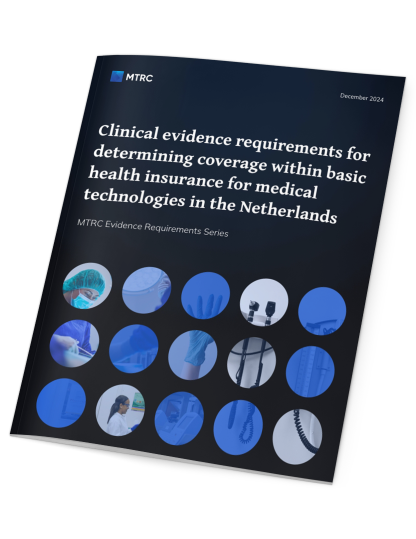
Key topics
There are two key themes describing market access for medical technologies in the Netherlands:
- Reimbursement: payment mechanism via the DRG system, supplementary payments via the so-called “other care products” (OZPs)
- Funding: recommendations for coverage in the Basic Health Insurance by the Dutch Healthcare Institute
The Netherlands does not have a stand-alone health technology assessment (HTA) framework; HTA is incorporated in the funding decision-making.
The innovative payment schemes for medical technologies in the Netherlands include the subsidy scheme for promising care and small-scale experiments.

Reimbursement
All specialist (inpatient, day case, ambulatory) care within the same Major Disease Category (MDC) provided within a certain period (for most services – 120 days; for surgical procedures – 42 days) is covered via a single DRG payment.
The payment system consists of the following components:
Diagnosis-related groups
- DRGs are determined by the combination of a procedure code (zorgactiviteit) and a diagnosis code. The procedure coding nomenclature and the DRG system are maintained by the Dutch Healthcare Institute (NZa) and released annually
- Around 30% of DRGs have their maximum tariffs determined at the national level by the NZa. The reimbursement tariffs for other DRGs are negotiated between individual hospitals and insurance companies
Supplementary payments – “other care products” (OZPs)
- Specialist services not reimbursed via DRG (as a stand-alone payment or in addition to the DRG payment), are referred to as the so-called “other care products”, OZPs
- The OZPs are determined by the NZa as a part of the DRG package. There are five categories of OZPs, the key ones being Supplementary Products (reimbursement for expensive medication, stay in the ICU, on top of the DRG tariff), First-Line Diagnostics (diagnostic imaging and IVD tests, reimbursed on a fee-for-service when requested by a General Practitioner), and Optional Services (allows healthcare providers and insurers to create novel payment categories for well-established care)
The DRG system is approved annually.

Funding
Major innovations typically need a positive coverage decision by the Minister in order to be covered within basic health insurance. This usually happens when a new procedure code is requested from the NZa. The foundation for the coverage decision is the position of the Dutch Healthcare Institute (ZIN), which uses HTA methodology to evaluate existing evidence to determine conformity of care with the “state of science and practice”.

Specifics for IVD tests
In-vitro diagnostic tests provided in specialist settings are covered by the DRG tariff for the continuum of care. In-vitro diagnostic tests are reimbursed on a fee-for-service basis only if requested by a primary care physician (via the OZP mechanism).
Get insights from MTRC free analytical reports
Gain in-depth insights into evidence requirements for medical technologies in the Netherlands with free MTRC analytical reports and white papers

Explore MTRC research papers:
How can MTRC help?
Development of reimbursement analysis (procedure coding, payment mechanism, reimbursement tariffs, policy and HTA considerations)
Development of market access strategy
Adaptation of the global health economic model to the Dutch settings
Access to an educational seminar on the Dutch reimbursement system
MTRC has experience with more than 219 projects in the Netherlands
Get in touch
Contact us to discuss your needs and learn about our services



